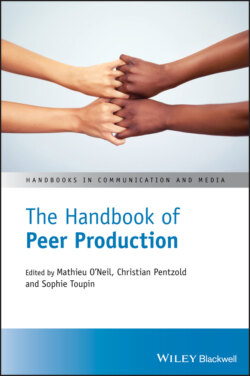Читать книгу The Handbook of Peer Production - Группа авторов - Страница 60
3.3 Equipotentiality
ОглавлениеMichel Bauwens (2005) suggested that P2P processes aim to increase the most widespread participation by equipotential (“equal” + “potential”) participants. The processes of peer production are characterized by the adoption of equipotentiality as an organizing principle. This means that everyone can potentially cooperate in a project, and, thus, in principle no authority can pre‐judge the ability to cooperate. The quality of cooperation is then judged by the community of peers, i.e., through communal validation. In equipotential projects, participants self‐sort themselves into the module to which they feel able to contribute.
A related term, used by Jimmy Wales (2014) of the Wikipedia project, is anti‐credentialism, which refers to the fact that no credentials are asked beforehand. This means that there is no a priori selection to participation. What matters is the ability to carry out a particular task, not any formal a priori credential. The capacity to cooperate is verified in the process of cooperation itself. Thus, projects are often open to all comers provided they have the necessary skills to contribute to a project. These skills are verified, and communally validated, in the process of production itself. Reputation systems may also be used for communal validation. The filtering is a posteriori, not a priori. Anti‐credentialism is therefore to be contrasted to traditional peer review, where credentials are an essential prerequisite to participate. However, the “expert” is not a persona non grata in peer production (O’Neil, 2010). Rather, equipotentiality, through a process that is far from flawless, allows the crowds to engage with experts to produce content, designs, code, and more.
